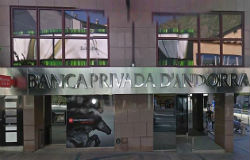The United States has accused Venezuela’s state oil company PDVSA of laundering $2 billion through offshore bank accounts, in the latest blow to the credibility of President Nicolas Maduro’s administration.
In a March 10 press release, the US Department of the Treasury’s Financial Crimes Enforcement Network (FinCEN) stated that a high-level manager at the Andorran bank Banca Privada d’Andorra (BPA) created front companies and financial products to siphon off money from PDVSA. In total, the BPA processed $2 billion in PDVSA funds as part of the scheme, according to FinCEN.
Unidentified sources told El Nuevo Herald that the United States is investigating the possibility that PDVSA was used to launder money stemming from criminal activity such as drug trafficking and terrorism.
The accusations are part of a wider investigation into BPA, which FinCEN said has also laundered money for Russian and Chinese criminal organizations.
InSight Crime Analysis
The accusation of a massive money laundering network run within PDVSA has serious implications for President Nicolas Maduro’s administration. PDVSA is a principal economic motor for the Venezuelan economy, and has largely financed the Chavista regime. Although no government officials have been formally accused in this case, the close association between the two state institutions does not help Venezuela’s poor track record on official corruption.
Indeed, this is not the first time PDVSA has been implicated in wrongdoing. In January, a Venezuelan defector claimed that PDVSA airplanes were used for drug smuggling, and that the oil company laundered the proceeds. Authorities have also arrested a PDSVA executive and an official in Venezuela’s oil ministry this year on corruption charges. Considering the fact that the country’s largest drug trafficking group is thought to be the Cartel of the Suns, which is comprised of corrupt Venezuelan military officials, the idea that PDVSA could be laundering drug money is not outlandish.
SEE ALSO: Venezuela News and Profiles
What’s more, clients associated with Venezuela have nearly $15 billion stashed in Swiss HSBC bank accounts, more than double the amount held by individuals connected to any other Latin American country. While money in HSBC Swiss accounts does not necessarily imply wrongdoing, the bank has repeatedly been fined for failing to report suspicious transactions and in 2012 paid a $1.9 billion settlement for allegedly facilitating money laundering.
Given the well-documented diplomatic tensions between the United States and Venezuela, it is possible the timing of FinCEN’s report was politically motivated. The press release came just a day after the US government declared that the political and economic turmoil in Venezuela posed an “extraordinary threat to the national security and foreign policy of the United States.” The United States also sanctioned seven Venezuelan government officials for their role in human rights abuses.

